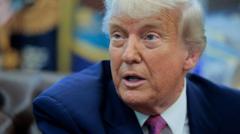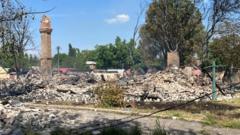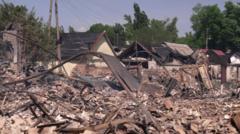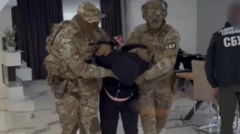In a recent meeting with Ukrainian President Volodymyr Zelensky, German Chancellor Friedrich Merz confirmed Berlin's commitment to support Ukraine in developing long-range missile capabilities. This move comes as Ukraine ramps up its defense against ongoing Russian aggression, with discussions around increased military cooperation taking center stage.
Germany Pledges Support for Ukraine's Long-Range Missile Production
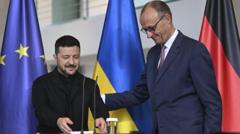
Germany Pledges Support for Ukraine's Long-Range Missile Production
Chancellor Friedrich Merz announces plans to assist Ukraine in producing long-range missiles amidst heightened tensions with Russia.
Germany's new chancellor, Friedrich Merz, has extended a commitment to support Ukraine in the production of long-range missiles, aiming to bolster Kyiv's defenses against Russia. In a press conference following his meeting with Ukrainian President Volodymyr Zelensky in Berlin, Merz stated, “We want to talk about production and we will not publicly discuss details,” when queried about Germany's potential contributions to Ukraine’s missile arsenal.
Taking office earlier this month, Merz has positioned himself as a more assertive ally for Ukraine than his predecessor, emphasizing that there are “no longer” limits on the types of weaponry supplied to Kyiv from Western allies. The long-range Taurus missile, capable of striking targets up to 500 kilometers away, could significantly enhance Ukraine’s military capabilities—potentially reaching deeper into Russian territory than previously available missiles.
Details of a forthcoming “memorandum of understanding” regarding missile cooperation between German and Ukrainian defense officials are expected to be finalized soon. The Kremlin has responded cautiously, warning that lifting restrictions on Ukrainian missile capabilities could escalate the conflict and derail ongoing peace negotiations. Nonetheless, Merz has reiterated that such decisions around armament policies were made by Western allies months prior.
Merz’s assertive approach marks a stark contrast to the previous administration's cautious stance, as he aims to establish a more robust partnership with Ukraine. He reassured Zelensky of Germany's unwavering support, indicating that any refusal from Moscow to engage in peace talks would come with “real consequences.”
Efforts for peace dialogues have been ongoing, with Zelensky proposing a format involving three leaders, which includes discussions with Donald Trump and Vladimir Putin. Although initial peace talks held in Istanbul earlier have led to minor agreements, such as prisoner exchanges, more substantial resolutions remain elusive. Russian Foreign Minister Sergei Lavrov has signaled a readiness for a second round of negotiations, expected to outline Russia's peace terms in June.
Despite diplomatic efforts, violence continues to escalate, with Ukraine reporting significant drone attacks on Russian territories and increasing Russian troop movements along the eastern front. Merz's recent declarations amplify the stakes in the ongoing situation as the conflict enters its fourth year, with heavy casualties and widespread destruction across Ukraine. As the war rages on, both diplomatic and military strategies are evolving rapidly amidst a challenging backdrop of geopolitical tensions.
Taking office earlier this month, Merz has positioned himself as a more assertive ally for Ukraine than his predecessor, emphasizing that there are “no longer” limits on the types of weaponry supplied to Kyiv from Western allies. The long-range Taurus missile, capable of striking targets up to 500 kilometers away, could significantly enhance Ukraine’s military capabilities—potentially reaching deeper into Russian territory than previously available missiles.
Details of a forthcoming “memorandum of understanding” regarding missile cooperation between German and Ukrainian defense officials are expected to be finalized soon. The Kremlin has responded cautiously, warning that lifting restrictions on Ukrainian missile capabilities could escalate the conflict and derail ongoing peace negotiations. Nonetheless, Merz has reiterated that such decisions around armament policies were made by Western allies months prior.
Merz’s assertive approach marks a stark contrast to the previous administration's cautious stance, as he aims to establish a more robust partnership with Ukraine. He reassured Zelensky of Germany's unwavering support, indicating that any refusal from Moscow to engage in peace talks would come with “real consequences.”
Efforts for peace dialogues have been ongoing, with Zelensky proposing a format involving three leaders, which includes discussions with Donald Trump and Vladimir Putin. Although initial peace talks held in Istanbul earlier have led to minor agreements, such as prisoner exchanges, more substantial resolutions remain elusive. Russian Foreign Minister Sergei Lavrov has signaled a readiness for a second round of negotiations, expected to outline Russia's peace terms in June.
Despite diplomatic efforts, violence continues to escalate, with Ukraine reporting significant drone attacks on Russian territories and increasing Russian troop movements along the eastern front. Merz's recent declarations amplify the stakes in the ongoing situation as the conflict enters its fourth year, with heavy casualties and widespread destruction across Ukraine. As the war rages on, both diplomatic and military strategies are evolving rapidly amidst a challenging backdrop of geopolitical tensions.







